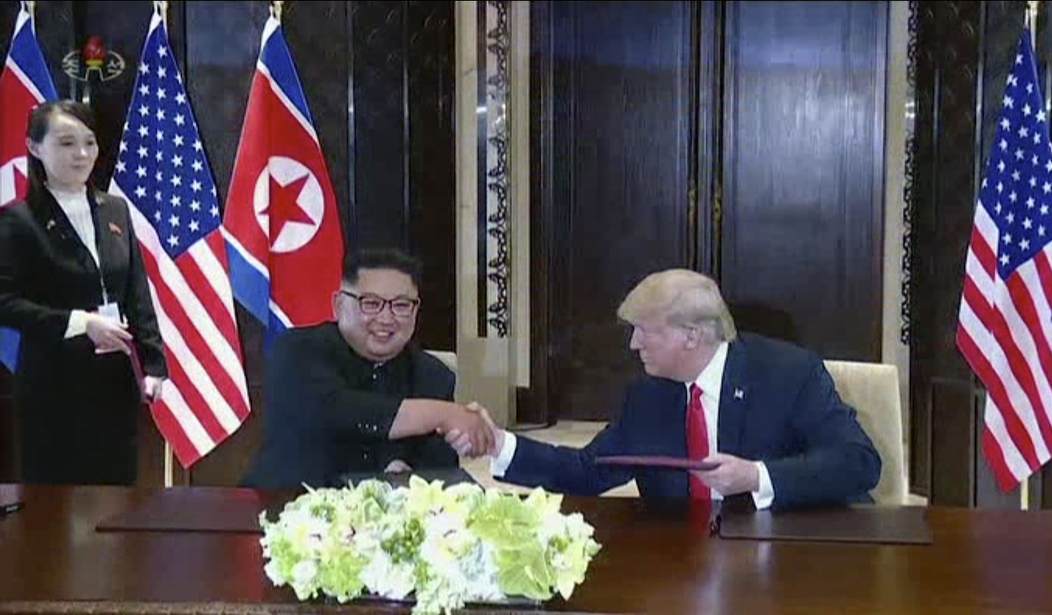President Donald Trump and North Korean leader Kim Jong Un introduced a new kind of reality show when they met in Singapore. It wasn't a matter of who would be fired or voted off the island. The stakes were nuclear, or, to be precise, the "complete denuclearization of the Korean Peninsula." This was the powerful aphrodisiac that lured the president to Singapore.
Is Kim singing the siren's song? Or is he serious? Was this reality TV or merely reality? These are the questions that engaged us as we watched the president's dealmaking. The coverage was more a review of theatrics than high-stakes negotiation and framed as which man was the better actor.
If Trump entered from stage left and Kim walked in from stage right, who dominated center stage?
"Little Rocket Man" and the "dotard," as they once described each other, were watched for their body language in the spotlight together. We tried to detect who displayed dominance and who betrayed weakness. What did a taut mouth, a downward gaze and a half-smile mean? Much of the coverage focused on the spectacle as performance art. Performance art usually works well on television, but it wasn't very illuminating this time.
The cameras followed the two men separately as they arrived. Once together, cultural signals came into play. The Korean leader, shorter in stature but looking slimmer than usual in a black buttoned-up jacket and squared-off haircut, could have been the taller, barrel-chested man's son. The president's loosely fitting dark suit, red tie and unusually tidy yellow hair showed a paternal presence.
Recommended
"At times Kim seemed the more neutral, and even uncomfortable, while Trump appeared to be the one more at ease and in control," observed the South China Morning Post of Hong Kong. Kim's lack of eye contact and his rationed smiles are explained as cultural dictates rather than expressive attitudes.
The president, ever the alpha male, touched the Korean's arm several times after an extended handshake, as though he were a prize fighter with a lighter touch than if he were actually in the ring. He was unmistakably in control. Western mores allow for greater physical contact, which puts the Asian at a disadvantage on the television screen but not behind the scene. We get the feeling that the Korean leader is more constrained, holding back, determined not to lose face. Trump, always playing for the reaction, is quick to show a playful side, telling the photographers to make them look "handsome and thin." Very Western.
But all this attention to stage direction rather than plot does not tell a lot about what actually happened in Singapore. That must play out on the larger stage, and over time. Summits are short. International power plays are not.
"Maybe in a year you'll be interviewing and I'll say I made a mistake," the president had told ABC's George Stephanopoulos as the players gathered at the summit. "It's possible. We're dealing at a very high level. A lot of things can change. A lot of things are possible."
Donald Trump won an American election because he could read what his base wanted, and he plays it back to his base in rough and tough vulgarity. This stands in strong contrast to what former President Barack Obama and Hillary Clinton had to offer. He was showing off what Harvard professor Harvey Mansfield defines as the most elemental kind of "manliness," a raw character that is rough, gross and even discourteous, and exudes animal strength.
That style usually doesn't work on the diplomatic stage, so Trump showed a quieter, almost boyish masculinity. He turned the encounter with the Korean dictator into something that might be described as infatuation. He says he trusts Kim after being alone with him for only 65 minutes at a summit that lasted less than five hours. That trust seems based more on what might be called the Trump feminine side, his intuition rather than his shrewder, more realistic methods of assessment: "I just feel strongly, my instinct ... they want to make a deal."
In the flush of infatuation, relying on instinct and intuition to determine whether his Korean counterpart is "personally committed," he gave his newly beloved an expensive engagement present, calling off joint military exercises with South Korea in exchange for promises that the North Koreans will start "immediately" to "de-nuke." Or at least soon.
The president had played down expectations for the summit while anticipating "much more than a photo op." Now expectations demand clarity about how to verify that trust before the next photo op can show a denuclearized peninsula. A lot of things can change. Or not.

























Join the conversation as a VIP Member